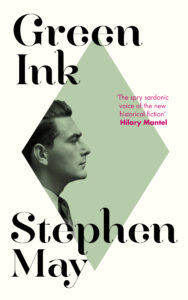We were delighted to welcome the novelist Stephen May to our monthly lunch on 20 March at the National Liberal Club in Westminster, and to hear about his latest book, Green Ink. May is the author of six novels, including the Costa-shortlisted Life! Death! Prizes! Like his previous book, Sell Us the Rope (2022), based on Stalin’s 1907 visit to London to attend a Russian party congress, Green Ink is inspired by real historical events.
 Interviewed by the Authors’ Club Chair Lucy Popescu, he explained that he first came across the story of Victor Grayson, a firebrand Socialist turned secret service informant who disappeared mysteriously in 1920, because he was once the MP for Colne Valley in West Yorkshire, where he now lives.
Interviewed by the Authors’ Club Chair Lucy Popescu, he explained that he first came across the story of Victor Grayson, a firebrand Socialist turned secret service informant who disappeared mysteriously in 1920, because he was once the MP for Colne Valley in West Yorkshire, where he now lives.
During the First World War, on the verge of bankruptcy after losing his seat, Grayson accepted government money to use his oratorical skills to urge working-class men to enlist, for which he was vilified by his former comrades. After the war, keen to re-establish his radical credentials, he set about exposing the Prime Minister Lloyd George’s sale of honours: brokered by his fixer, the ‘monocled dandy’ Maundy Gregory, a knighthood could be had for £10,000, a baronetcy for £40,000. Then, one September night, Grayson stepped out of a Thameside pub and was never seen again, his disappearance unreported for seven years.
Out of this murky affair, Stephen May has crafted a dark political thriller. The novel begins sensationally, with the Prime Minister at Chequers in bed with his mistress Frances Stevenson, while the bisexual hedonist Grayson rises from a threesome in a sleazy London boarding house feeling ‘rough as a badger’s arse’.
That’s just the first thirty pages, but ‘I don’t think anyone is ever put off reading a book by a bit of raunchiness,’ May explained – though you could sense the tremors his unflattering portrayal of the last great Liberal Prime Minister sent through the hallowed halls of the National Liberal Club.
 What attracted him to the story was its contemporary resonance. Whatever period historical novelists are writing about, he said, citing the example of Hilary Mantel, they are always writing about their own. Then as now, in the aftermath of a global pandemic, the great powers were dividing up the world, with Europe trying to have some say. He was also struck by the comparison between the influence of Frances Stevenson on Lloyd George (he made her his personal secretary, and she accompanied him to international conferences) and the relationship of Boris Johnson and his wife Carrie. But of course, no government would think of selling honours these days…
What attracted him to the story was its contemporary resonance. Whatever period historical novelists are writing about, he said, citing the example of Hilary Mantel, they are always writing about their own. Then as now, in the aftermath of a global pandemic, the great powers were dividing up the world, with Europe trying to have some say. He was also struck by the comparison between the influence of Frances Stevenson on Lloyd George (he made her his personal secretary, and she accompanied him to international conferences) and the relationship of Boris Johnson and his wife Carrie. But of course, no government would think of selling honours these days…
Asked about his literary influences, May mentioned Kafka, Angela Carter and Fay Weldon, although to capture the atmosphere of London in the 1920s, he drew on Virginia Woolf and Evelyn Waugh.
As for his own views on his protagonist, Stephen May said, ‘He’s a bit of a Lord Lucan figure in that people love to believe he’s still alive somewhere.’ Jeremy Corbyn, he added, regards Grayson as a socialist hero, and thinks there’s still an unopened file on him. And what really became of him? ‘He most likely fell in Thames pissed, but that’s an unsatisfactory ending.’
